Regional Anesthesiology & Acute Pain Medicine Fellowship
The ACGME-accredited Regional Anesthesiology & Acute Pain Medicine (RAAPM) Fellowship is a collaboration between two of the main teaching centers at McGaw Medical Center of Northwestern University: Northwestern Memorial Hospital (NMH) and Ann & Robert H. Lurie Children's Hospital of Chicago.
During this 12-month fellowship, fellows become experts in the theory and practice of regional anesthesiology through the enthusiastic teaching and mentorship from our dedicated faculty, a robust clinical experience in adults and children, and an in-depth didactic program.
Program Director
Jessica Weeks, MD
Assistant Professor of Anesthesiology
Associate Program Director
Keziah Vargas, MD
Instructor of Anesthesiology
About the Program
Objectives
The RAAPM Fellowship Program at the McGaw Medical Center of Northwestern University is designed to train future leaders in clinical care and academic scholarship within the subspecialty of Regional Anesthesiology and Acute Pain Medicine.
After the fellowship program, graduates will be able to:
- Devise and execute regional anesthetic plans for healthy and medically complex adult and pediatric patients presenting for various types of surgery, including, but not limited to, orthopedic surgery, plastic surgery, breast surgery, general surgery, thoracic surgery, etc.
- Recognize and treat complications of regional anesthetic techniques and acute pain management, including hemorrhagic, infectious, neurological and pharmacological complications.
- Devise and execute an acute pain management plan for healthy and medically complex adult and pediatric patients experiencing surgical and non-surgical acute pain and acute-on-chronic pain.
- Exhibit their expertise in the utilization of ultrasound-guidance for the performance of routine and advanced peripheral nerve blocks in patients with normal and complex anatomy.
- Apply advanced anatomical, physiological and pharmacological knowledge to the practice of regional anesthesia and acute pain medicine.
- Effectively communicate a regional anesthetic or acute pain management plan to patients with procedural alternatives.
- Organize and manage an efficient regional anesthesia and acute pain medicine service.
- Effectively supervise and teach trainees in the practice of regional anesthetic and acute pain management procedures.
- Execute a quality improvement project.
- Present scholarly work at a national society meeting, such as ASA or ASRA.
Education
Clinical Education
Fellows will experience a diverse regional anesthesia and acute pain medicine clinical case load while rotating at NMH and Lurie Children's. They will function as an integral member of the regional anesthesia team, both working alongside and supervising anesthesia residents. Over the course of the program, fellows are expected to develop their supervisory skills and transition into leadership roles within the regional and acute pain teams.
At NMH, fellows will have primary clinical responsibilities at different locations based on their rotation schedule: our orthopedic operating pavilion is located in the Lavin building, where fellows will get exposed to a high volume and diverse orthopedic population with a focus on primary anesthetic nerve blocks and fast-track encounters; at the Feinberg/Galter pavilions, the fellows will gain experience with highly complex patients requiring advanced blocks and nerve catheters, as well as the acute pain service. Overall, fellows will gain experience in regional anesthesia and acute pain management, with an emphasis on indications, contraindications, side effects, potential complications, and perioperative management of patients receiving regional anesthesia and those on the acute pain service. Specifically, fellows will become experts in multimodal analgesic techniques, neuraxial procedures, peripheral nerve blocks, peripheral nerve catheters, local anesthetic infusions, narcotic infusions and non-narcotic analgesic adjuvants.
At Lurie Children's, fellows will gain experience in the multimodal analgesic management of infants, children and adolescents, including the use of neuraxial techniques, peripheral nerve catheters, opioid infusions and non-opioid adjuvants, with an emphasis on indications, adverse effects, potential complications and the everyday management of infusions. The fellow will manage the regional anesthesia service under faculty guidance and will execute regional anesthesia techniques in infants, children and adolescents. Specifically, the fellows will perform head and neck blocks, upper and lower extremity blocks, truncal blocks, thoracic epidural catheters and lumbar epidural catheters. The fellow will be provided an opportunity to supervise anesthesia residents in the use of ultrasonography for peripheral and central neuraxial blocks.
Rotations
- Northwestern Memorial Hospital (9 months)
- Regional Anesthesiology (6 months)
- Acute Pain Medicine (3 months)
- Chronic Pain (2 weeks)
- Lurie Children’s Hospital (3 months)
- Regional Anesthesiology
- Acute Pain Medicine
- Chronic Pain
Research/Scholarly Work
Fellows are expected to perform research or other scholarly projects under the mentorship of a faculty member. Fellows will have a bank of 12 protected nonclinical days for approved scholarly activities that can be taken intermittently or sequentially.
Quality Improvement
Fellows will complete at least one quality improvement project under the mentorship of a faculty member. Projects should be designed to address at least one of the domains of healthcare quality(safe, effective, patient-centered, timely, efficient, equitable). Fellows will complete a formal project proposal that the program director must approve. After implementation, fellows will summarize and present the project and its impact to the faculty.
Conferences
- Bi-weekly dedicated Regional Anesthesiology and Acute Pain Medicine Fellowship Lecture Series. This lecture series is curated to cover advanced topics in the subspecialty. Fellows are relieved from clinical duties to attend.
- Weekly Regional Anesthesia Journal Club/M&M. Residents and fellows will select and present landmark articles or recent research papers. The fellows will assist residents in article selection under the guidance of faculty.
- Bi-weekly Anesthesiology Common Fellowship Lecture Series. This lecture series is curated to cover topics important to Anesthesiology fellows in all subspecialties, including professional development, career planning and board preparation.
- Weekly Department of Anesthesiology Grand Rounds. Fellows will attend Grand Rounds every week and will present a regional anesthesiology or acute pain medicine topic once per year.
- Weekly Resident Lecture Series. The fellows will present a topic to the residents as part of the Regional Anesthesiology Rotation Lecture Series.
- Weekly Ultrasound Workshop at Lurie Children’s. While rotating and Lurie Children's, fellows will teach, with faculty guidance, a hands-on ultrasound workshop to residents.
Simulation
Fellows will participate in a dedicated simulation curriculum designed to expose them to rare complications and patient safety events. This curriculum will be administered by regional anesthesia faculty and will occur in the Northwestern Anesthesiology Center for Clinical Simulation.
Research
Fellows will have the opportunity to participate in clinical and/or laboratory research and will be given appropriate non-clinical time to fulfill these goals. There will be opportunities for the fellow to become involved in research already in progress or to develop an original project. An appropriate attending anesthesiologist will be appointed to mentor and assist the fellow to facilitate these goals.
The types of activities that would suffice as academic projects include:
- Research paper and/or case report submitted to a peer-reviewed journal and presented at a national society meeting.
- Clinical chart review or a review article submitted to and accepted by a peer-reviewed journal
- Book chapter or other endeavors.
- Grant submission for extramural funding.
Fellows will have the opportunity to participate in regional anesthesia workshops at national meetings, including the American Society of Anesthesiology (ASA), American Society of Regional Anesthesia and Pain Medicine (ASRA), Society for Pediatric Anesthesia (SPA) and the International Anesthesia Research Society. Fellows are required to attend at least one national meeting.
Evaluations
Benefits
Please visit the McGaw Medical Center of Northwestern University Benefits and Wellness Resources site for more information.
Faculty
The fellows will have access to a faculty core with diverse academic backgrounds and experience at top national institutions for regional anesthesia, including Northwestern, Brigham and Women's, Johns Hopkins, Hospital for Special Surgery and UPMC. As such, the fellows will be exposed to a significant breadth of procedural styles and techniques.
- Jessica Weeks, MD, MEHP (Program Director)
- Keziah Vargas, MD (Assoc. Program Director)
- Yogen Asher, MD
- Nicholas Burjek, MD
- Liting Chen, MD (Course Director, Grand Rounds)
- Brian Chung, MD
- Alexander DeLeon, MD (Assoc. Chair, Operational Staffing)
- Vicente Garcia-Tomas, MD (Chief, Division of Regional Anesthesiology & Acute Pain Medicine)
- Jacob Heninger, DO
- Eric Kamenetsky, MD (Director of Quality)
- Seth Klapman, MD
- David Krodel, MD, MS
- Alina Lazar, MD
- Tiffany Liu, MD
- Antoun Nader, MD (Associate Chair of Research)
- Mitchell Phillips, MD
- Ravi Shah, MD
- Luminita Tureanu, MD
- Angelica Vargas, MD
- Amy Wagenaar, MD
How to Apply
Applications for the 2025-26 fellowship year are now closed. Please check back here for updates on the 2026-27 year.
Required documents
- A current curriculum vitae
- Official copies of scores for USMLE Steps 1-3
- Results of the two most recent ABA/ASA in-training exams
- Two letters of recommendation from anesthesiologists
- One letter of recommendation from the anesthesiology training program director or chair
- A brief statement explaining interest in pursuing a fellowship position
To be considered for a Regional Anesthesiology and Acute Pain Medicine fellowship position, candidates must be eligible for certification or fully certified by the American Board of Anesthesiology before fellowship training begins.
Candidates must have taken USMLE Step 3 and obtain a temporary or permanent Illinois Medical License before starting their fellowship training. Licensing information and application can be found at the Illinois Department of Financial & Professional Regulations website. To apply for a permanent license, the applicant must already have taken the USMLE Step 3. Please be aware that it may take up to 60 days to process and grant an Illinois license.
For more information, contact Northwestern's Office of Graduate Medical Education:
McGaw Medical Center of Northwestern University
420 E. Superior St.
Suite 9-900
Chicago, IL 60611
312-503-7975
Current and Recent Fellows
Class of 2026
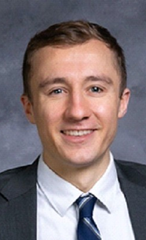
Residency: McGaw Medical Center of Northwestern University
Medical School: Northwestern University Feinberg School of Medicine
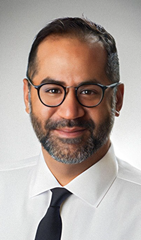
Residency: Advocate Illinois Masonic Medical Center
Medical School: American University of Antigua College of Medicine
Class of 2025
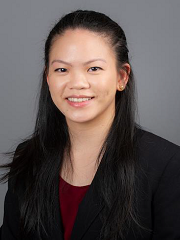
Residency: Northwestern University
Medical School: Rosalind Franklin University of Medicine & Science
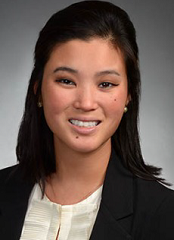
Residency: University of Illinois
Medical School: Loyola University of Chicago
Class of 2024
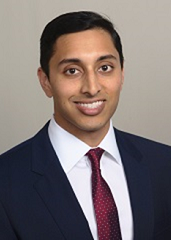
Residency: University of Illinois College of Medicine at Chicago
Medical School: Oklahoma State University Center for Health Sciences College of Osteopathic Medicine
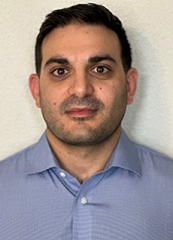
Residency: Ochsner Clinic Foundation
Medical School: Central Michigan University College of Medicine
Class of 2023
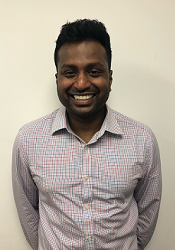
Residency: Rush University
Medical School: Rush University
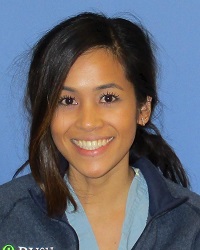
Residency: Rush University
Medical School: Ross University School of Medicine
Graduate Research Resources
We offer a wide range of resources, mentorship opportunities and training to help our residents and fellows excel as physician-scientists. Explore all of the resources and hear from trainees who are making research a major part of their career development plans.